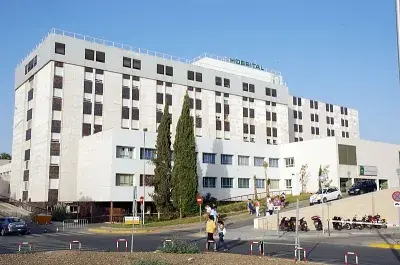Energy consumption to maintain the quality requirements in a hospital is very high, both to achieve the thermal levels that are needed in each area, as well as to guarantee the electricity supply necessary for the development of the different activities carried out 24 hours a day, 365 days a year. It is for this reason a few well-designed systems, with efficient technologies and a correct maintenance, are essential to ensure the service without increasing the energy bill of the centre.
Aware of this, the Andalusian Energy Agency and the Andalusian Health Service (Servicio Andaluz de Salud, SAS, Regional Ministry, Andalusian Regional Government) signed an agreement in March 2010 to carry out energy saving and efficiency actions and the implementation of technologies for the use of renewable energy sources in 14 hospital centres managed by the Andalsian Health Service. The amount of this agreement reached 20.1 million euros, 17.9 million euros of which are provided by the Andalusian Energy Agency and the remaining 2.2 million euros is contributed by the Andalusian Health Service.
This great project is part of the initiatives designed from the Energy Management Network of the Andalusian Regional Government (REDEJA), tool created by the Andalusian Regional Government in 2007 in the structure of the Andalusian Energy Agency, intending to take the principles of energy saving and rational use of energy to the administration, aiming at all times for a greater economic and energetic efficiency within its buildings and activities.
In this line, the Energy Network calculates the final energy consumption of the Andalusian public hospital sector at 45,000 equivalent tons of oil (toe), approximately the same energy consumed by 60,000 homes. On the other hand, the network has carried out more than 20 energy audits in these centres, in which an energy saving potential of more than 20% has been identified in most cases.
As a result of these audits, an important set of measures has been included in the agreement, among which are:
- Change of fuel from diesel to natural gas in the boilers to produce hot water more efficiently and with lesser emissions, as well as the replacement of heating and air conditioning equipment of low performance by other more efficient systems.
- Implementation of systems that allow the generation of electricity and heat of high performance, and which covers between 50% and 60% of the hot water, heating and cooling needs.
- Implementation of renewable energy for the production of hot water through solar thermal installations and use of biomass.
All these installations, as well as the reforms that will be carried out, will offer an estimated energy saving of approximately 700 equivalent tons of oil (toe) and 1,570 reductions of CO2 emissions, and will contribute to the maintenance and improvement of the assistance given to the users and will reduce the energy billing of the above mentioned buildings in 3,214,517 € annually.
The hospitals belonging to the Agreement are listed below:
| Hospital centres | Town | Province | Energy consumption toe/year |
|---|---|---|---|
| Hospital de Jerez | Jerez de la Frontera | Cádiz | 3.089 |
| Hospital de Baza | Baza | Granada | 879 |
| Hospital Punta Europa Algeciras | Algeciras | Cádiz | 1.870 |
| Hospital de Valme | Sevilla | Sevilla | 3.117 |
| Hospital Valle de los Pedroches | Pozoblanco | Córdoba | 990 |
| Hospital Río Tinto | Río Tinto | Huelva | 775 |
| Hospital San Juan de la Cruz | Úbeda | Jaén | 1.247 |
| Hospital de la Axarquía | Vélez-Málaga | Málaga | 1.275 |
| Hospital La Merced | Osuna | Sevilla | 1.469 |
| Hospital Infanta Margarita | Cabra | Córdoba | 1.460 |
| Hospital La Inmaculada | Huércal-Overa | Almería | 1.467 |
| Hospital Infanta Elena | Huelva | Huelva | 1.010 |
| Hospital San Agustín | Linares | Jaén | 1.163 |
| Hospital de Santa Ana | Motril | Granada | 1.231 |
| TOTAL | 21.042 |



